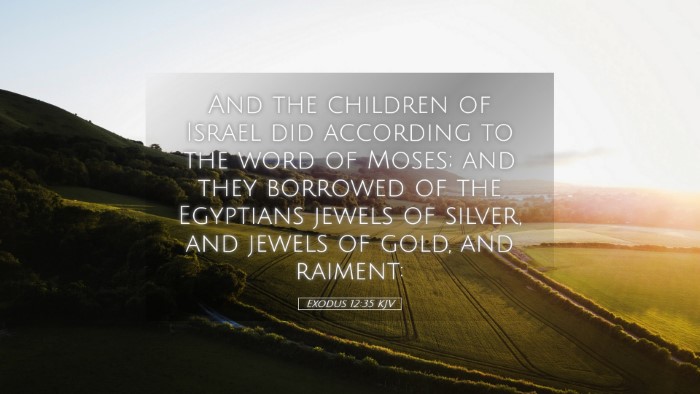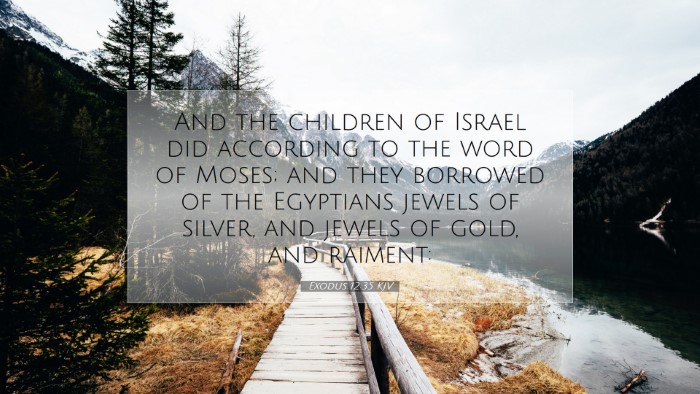Exodus 12:35 - Summary and Commentary
Verse Context: Exodus 12:35 states, “And the children of Israel did according to the word of Moses; and they borrowed of the Egyptians jewels of silver, and jewels of gold, and raiment.” This verse occurs at a pivotal moment in the Exodus narrative, marked by the impending departure of the Israelites from their slavery in Egypt.
Understanding the Passage
This verse illustrates the culmination of God’s plan for the Israelites’ deliverance and their transition into freedom. It reveals not only their obedience to Moses but also God's provision for them as they leave Egypt, equipping them with goods that would later be used for worship and sustenance.
Commentary Insights
- Matthew Henry: Henry emphasizes the miraculous nature of God’s deliverance. He notes that the Israelites' borrowing of jewels and raiment was not merely a request but a divine compulsion. The favor God granted them is depicted in the surprising generosity of the Egyptians, who, plagued and ruined by the plagues, willingly parted with their possessions. This act symbolizes not only God's provision for His people but also a poignant irony — the oppressed taking treasure from their oppressors.
- Albert Barnes: Barnes highlights the term "borrowed" as potentially misleading. This transaction was more a result of divine instruction than a conventional borrowing, as the Israelites had no intention of returning these goods. He explains that this wealth was a fulfillment of God's promise to Abraham (Genesis 15:14), indicating that the Israelites would leave Egypt with possessions, thus affirming that God’s promises endure through generations.
- Adam Clarke: Clarke focuses on the practical implications of this wealth. He notes that leaving Egypt with riches enabled the Israelites to construct the Tabernacle and its furnishings, which were vital for their worship practices in the wilderness. Clarke also emphasizes the psychological dimension; the possession of wealth might serve to assure the transformed identity of the Israelites — from slaves to a nation set apart for God’s glory.
Theological Implications
The act of the Israelites receiving goods from the Egyptians illustrates several theological truths:
- Provision and Generosity: This moment encapsulates the theme of God's provision. God prepares His people not just for their immediate journey but for their future worship and communal identity.
- Fulfillment of Prophecy: The act signifies the fulfillment of God’s promise to Abraham, linking the narrative of Exodus back to the covenant with patriarchs, demonstrating God's faithfulness across generations.
- Transformation of Identity: The change in status from enslaved to wealthy signifies the transformation of the Israelites’ identity as God’s chosen people. This transition foreshadows their forthcoming covenant relationship with God at Sinai.
Practical Application for Leaders and Scholars
This passage offers several points of reflection and application for pastors, theologians, and students of the Bible:
- God’s Faithfulness: Reflect on how God faithfully provides for His people in times of transition. Explore how He may be preparing you or your congregation for future endeavors.
- Identity in Christ: Consider the implications of our identity as God's people. How does understanding our transformed status affect our mission and purpose in the world?
- Obedience to God’s Word: The Israelites’ action was rooted in obedience to God through Moses. Engage with how this obedience requires trust in God’s provision and purpose in today’s context.
- The Role of Wealth in Worship: The passage raises questions about the role of material goods in our relationship with God. How should resources be managed in the church and for communal worship today?
Conclusion
Exodus 12:35 serves as a profound reminder of God’s providence, the fulfillment of His promises, and the transformational journey of His people. As we examine this text and its implications, we are encouraged to recognize the deeper theological truths and their applicability to contemporary life. The act of 'borrowing' signifies not just a physical act but a spiritual transition, reminding us that God equips His people for their journey ahead.


